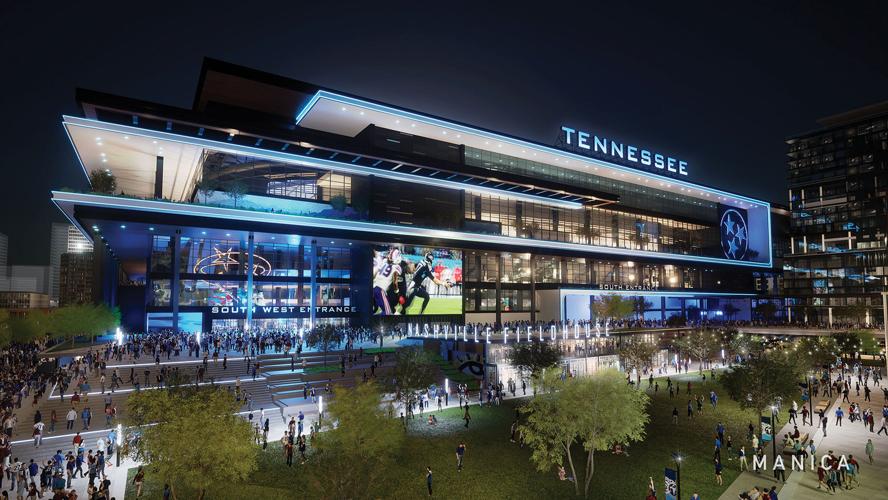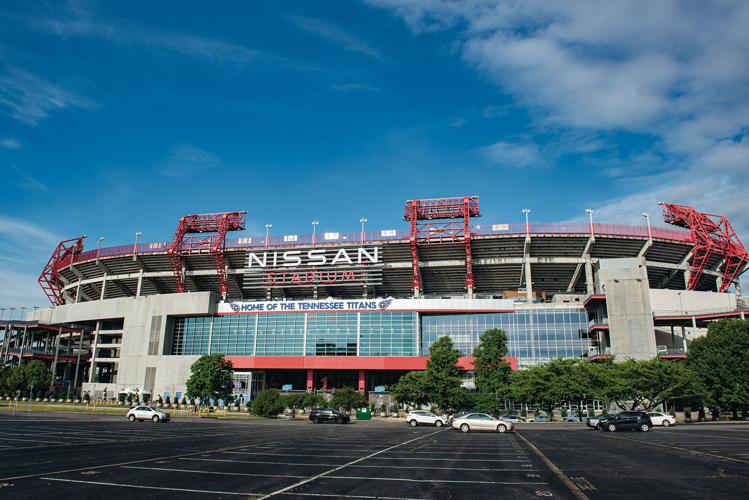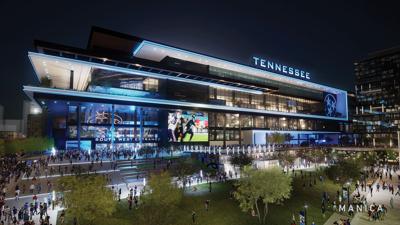Metropolitik is a recurring column featuring the Scene’s analysis of Metro dealings.
A week after Mayor John Cooper and Titans CEO Burke Nihill convened press at the Metro Courthouse to announce that the two parties planned to move forward with a new domed stadium for the team, Councilmembers Courtney Johnston and Delishia Porterfield described the deal’s state of play as “alarming.” On Twitter, District 7 Councilmember Emily Benedict referred to negotiations as a “backdoor deal” and called on the mayor to go “back to the drawing board — and involve Council first this time.”
“We’re accustomed to getting hustled,” said Councilmember At-Large Bob Mendes from his perch as chair of the council’s ad hoc East Bank Stadium Committee. “Round one, we’re told, ‘It’s nonbinding, it doesn’t matter, you’ve got plenty of time to decide on the final documents.’ ” Mendes, Porterfield and Johnston were discussing the deal’s terms sheet, the most complete picture of a prospective new lease, with representatives of the Cooper administration. “When we get to the second round, someone will play a video and say, ‘You committed.’ ”
Through capital spending plans and capital improvement budgets, the council has hemmed and hawed, expressing implicit and explicit frustration with Cooper, who at times has treated the body more like a stumbling block than a sounding board. Last-minute acquisitions of the Global Mall and the former Tennessee School for the Blind at 88 Hermitage — a key parcel for Wharf Park, one of Cooper’s remaining aspirations — grated councilmembers who pushed for more clarity and more time. In all cases, enough members fell in line when it came time to vote.
The Titans deal is already different. By sticker price, it’s the biggest item on the city’s budget. Next to brief flirtations with public transit, it’s among the most expensive projects the city has ever considered. The public has swapped gossip, glossy renderings and associated plans for a redeveloped East Bank, while the substance of negotiations has occurred in weekly closed-door meetings between the team and the mayor. Cooper preferred to deliver a final product rather than involve the council in the talks themselves, leaving most of the city’s elected officials to follow progress in the media. Now everyone else is eager to jump on the city’s $760 million obligation. It’s a far cry from the $1.8 billion the Titans said the city owed to renovate Nissan Stadium, but along with $500 million from the state, a historic amount of public money to shell out for a sports team. By conducting the deal in private and tightly controlling the narrative around it, often with carefully crafted talking points that emphasize some elements of the deal and obscure others, Cooper has shaken the faith of his colleagues in the people’s chamber.
The premise has united an unlikely coalition of Cooper critics. Fiscal conservatives, libertarians, labor unions, public housing advocates and neighborhood community groups have transformed into public spending wonks, eager to kick the tires on an eye-popping outlay of funds for a private business owned by a billionaire family. Opposition formed quickly in response to the deal’s top line — $2.1 billion for the second-most-expensive stadium in the world, funded mostly with tax dollars by a city and state struggling to provide a competitive public education system and basic health care for many of its citizens.
In a philosophical sense, the deal is that simple. Shouldn’t the government levy taxes to efficiently allocate public resources based on the priorities of voters? Why spend billions to build a new arena for a team that already has one? In the city’s legal and economic reality, Metro Nashville is struggling to choose between alternatives that all come with consequences — some political and some financial.

Nissan Stadium
Then-Mayor Phil Bredesen wooed the Houston Oilers to Nashville with generous lease terms in 1996. The city was saddled with providing a stadium in “first-class condition,” the operative phrase in today’s negotiations as the Titans point to billion-dollar facilities around the country. To meet that standard, says the team, the city would need to provide upgrades in the neighborhood of $1.8 billion through 2039, the life of the 1996 lease. Much of this dealmaking happened privately between Cooper and the Titans, producing a few headlines back in February that the city’s portion of a new stadium could be cheaper than what the Titans were asking for renovations.
Many critics are stuck on the fact that the city never presented its own number, at least not publicly. Doing so might push the team toward litigation or relocation, not to mention associated costs and political consequences for the mayor. Instead, the Titans’ interpretation of the lease has been the only one, setting the floor for the city’s financial obligations. In June, Councilmember Sean Parker added $200,000 to the budget to fund an independent review of the city’s lease obligations.
“In 2017 we did a study of what it would cost to keep Nissan Stadium in good condition,” said Parker in a budget work session. “That study determined it would be $300 million over 20 years. The estimates we’ve heard since then are considerably higher. I’m hoping to get a Metro side opinion about what our obligations are under the existing lease.”
It passed, and the mayor’s office coordinated with Venue Solutions Group, Brentwood-based consultants with specific expertise in stadium projects. The mayor’s office tasked VSG with an independent review of the Titans’ proposed renovations, returning a report that corroborated the team’s numbers but confused some councilmembers, who thought they were finally getting an estimate that wasn’t determined by the team’s preferred designs. Mayor Cooper relied on this number to announce in October that a new stadium is the prudent financial choice for the city.
The council, smarting from the familiar feeling of being shut out of the dealmaking process, now prepares to vet multiple moving parts under the watch of an executive branch that wants to get things moving. Tasked with the power of the purse, representatives are slowing the deal’s timeline in the name of taxpayer protection.
With three pieces of stadium legislation moving through four different council bodies, and a cost study that wasn’t quite what councilmembers expected, each week will bring more questions. The terms sheet — so far, the most controversial legislation on the Metro Council’s plate — is slated for a Dec. 6 discussion, then a vote, on the council floor.







